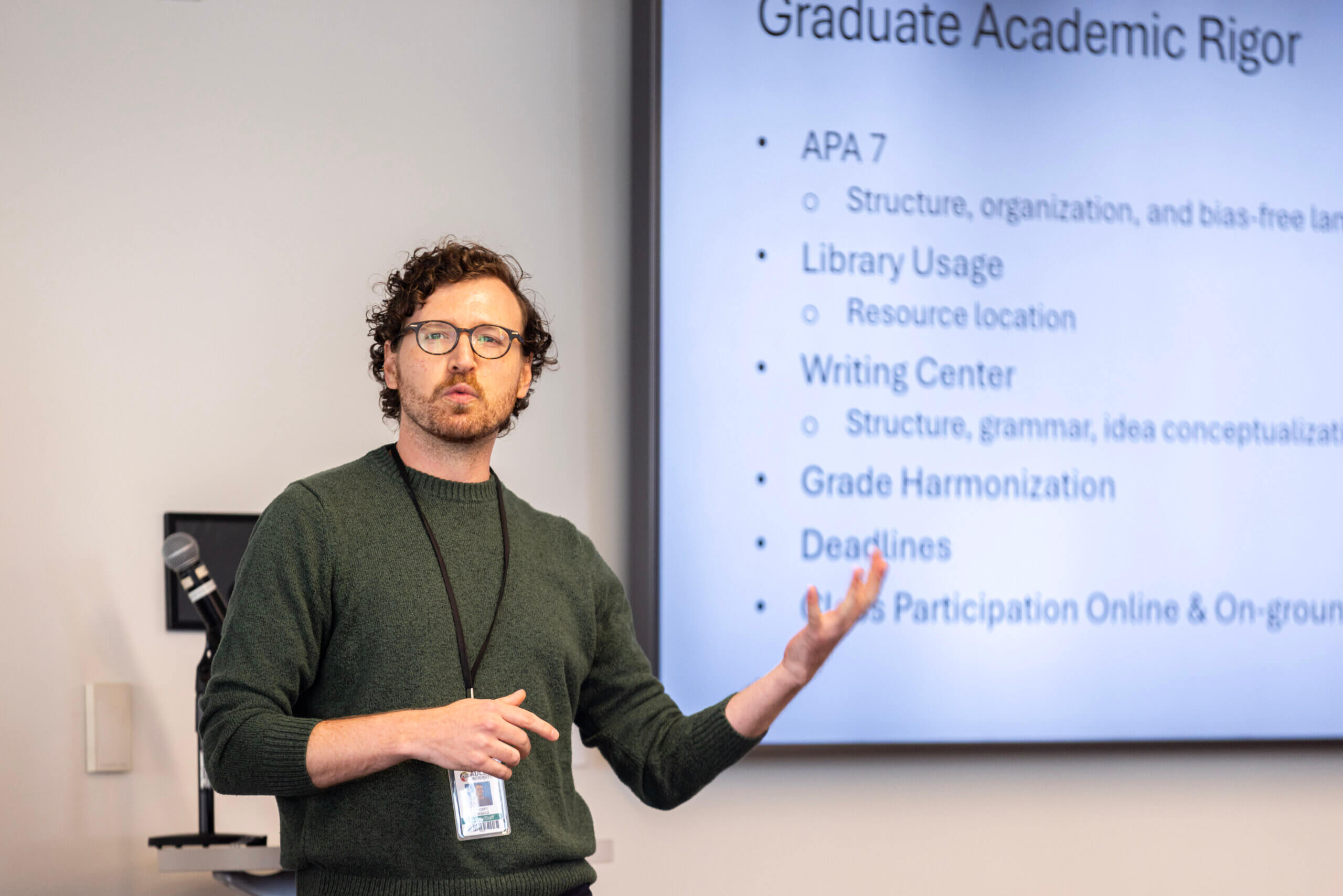
Doctor of Philosophy (Ph.D.) in Organizational Leadership
Online
The Adler University Doctor of Philosophy in Organizational Leadership advances the study and practice of organizational psychology through research, analysis, and innovation, building expertise to evaluate theory, create knowledge, and apply evidence-based approaches that strengthen organizations locally and globally.
- 66 credits
- 3-4 year program
- Part-time opportunities
- Asynchronous learning
- Dissertation advisors are experts and working in the field
- Ranked one of the county’s best online doctorates for leadership.
Admission Deadlines
| Term | Final |
|---|---|
| Spring II 2026 | 2/2/2026 |
| Summer I 2026 | 4/1/2026 |
| Summer II 2026 | 5/29/2026 |
| Fall I 2026 | 8/1/2026 |
Program overview
Across industries, organizations face unprecedented complexity shaped by globalization, technology, and shifting workforce expectations. Adler University’s Ph.D. in organizational leadership program positions graduates not just to respond to these challenges, but to generate new knowledge, influence policy, and guide systemic transformation.
Designed for experienced professionals, this doctorate emphasizes original inquiry, critical analysis, and evidence-based leadership, preparing graduates to drive innovation and shape the future of organizational systems.
Expert faculty bring both scholarly expertise and professional practice into the classroom, mentoring participants to connect advanced leadership theory with their own research interests.
Why choose the organizational leadership doctoral program at Adler?
- Adlerian perspective: Rooted in psychology and systemic thinking, the program emphasizes belonging, resilience, and leadership that strengthens entire organizational systems.
- Scholar–practitioner foundation: The program is built on Adler’s model that unites research with practice, preparing graduates to apply scholarship directly to organizational challenges.
- Mentorship model: Faculty serve as both scholars and practitioners, guiding candidates to align research with professional contexts and leadership goals.
- Transformational outcomes: Graduates lead not only in boardrooms and classrooms but also in shaping policy, influencing culture, and creating healthier organizations across sectors.
- Study anytime, anywhere: Asynchronous courses delivered fully online, with part-time options available.
- Recognized for excellence: Recognized by Intelligent.com as one of the country’s best online doctorates in organizational leadership.
The Path Ahead with an Adler degree
Adler’s Doctor of Philosophy (Ph.D.) in Organizational Leadership qualifies students to choose a career that helps them grow in their field or allows them to move into other industries and roles.

Corporate Leadership + Consulting
Advise executive teams, guide organizational transformation, and design evidence-based strategies that strengthen leadership, culture, and performance as a:
– Senior Management Consultant
– Organizational Development Director
– Executive Coach
– Change Management Strategist

Academia + Research
Contribute to the field by advancing organizational psychology through teaching, publishing, and conducting original studies that shape workplace science and practice in jobs like:
– Department Chair
– Professor of Industrial and Organizational Psychology
– Research Scientist
– Institutional Administration

Workforce Strategy + Human Resources
Design and oversee systems that attract, develop, and retain talent, using advanced analytics and psychological principles to drive organizational outcomes in roles like:
• Chief Human Resources Officer (CHRO)
• Chief Talent Officer (CTO)
• Chief Learning Officer (CLO)

Government + Policy
Influence workplace policy, employee well-being, and organizational effectiveness in public and international sectors, applying psychological science to systemic challenges as a:
• Government Policy Advisor
• Federal Agency Organizational Psychologist
• Military or Defense Human Performance Specialist
• International Relations Manager
*Data is from the Bureau of Labor Statistics.
Admission requirements
Eligibility
Applicants to this program are required to have:
- A master’s degree, by the date of matriculation, in industrial and organizational psychology, psychology, business, or a related discipline. Applicants who did not graduate from Adler University’s Master of Arts in Industrial and Organizational Psychology or an equivalent program may be required to complete the equivalency requirements in addition to the doctoral curriculum. (See Program Requisites.)
- A cumulative grade point average (GPA) of 3.0 or better (on a 4.0 scale) in their master’s degree. Successful applicants typically have a grade point average of 3.25 or higher on a 4.0 scale for graduate-level coursework.
Application Requirements
- Completed application submitted via the online portal.
- Resume or CV.
- Statement of Intent
- Applicants must submit the following materials for admission consideration:
- Official transcripts from all undergraduate and graduate schools attended (U.S. and Canada). International transcripts must be evaluated by a transcript evaluation service.
- A writing sample (e.g., a publication, report, or an essay or paper previously submitted as an assignment).
- Two letters of recommendation from an individual who can speak to the applicant’s likelihood of success in a doctoral program.*
- Master’s degree required.
*Applicants who are graduates or current students, in good standing, from Adler University master’s degree programs may have one letter of recommendation, the writing sample, and/or interview waived.
Program Requisites
Applicants are expected to have adequate coursework in the areas listed below. Applicants who did not graduate from Adler University’s Master of Arts in Industrial and Organizational Psychology, or an equivalent program, will be assessed to determine whether they have adequate coursework in the following master’s-level course areas, with a letter grade of B or better.
- One graduate-level research methods course: Research Methods or Research Methods in Organizational Psychology
How to Apply + Submit Transcripts
- Complete your application in Adler University’s online portal. The application, fee, Statement of Intent, resume/CV, and recommender details are submitted in the portal.
- Official transcripts must be sent directly from each issuing institution or approved service to the Office of Admissions prior to the application deadline. Do not upload official copies to the portal.
Unofficial transcripts may be accepted for any schools in which a degree was not received.
Adler University – Office of Admissions
17 N. Dearborn Street
Chicago, IL 60602
Official electronic transcripts should be sent to admissions@adler.edu.
Curriculum | Internships | practicums
Adler’s fully online Ph.D. in organizational leadership is a 66-credit, post-bachelor’s program. Following a scholar-practitioner approach, it blends advanced coursework with real-world applications, enabling students to translate learning into impact across their current and future careers.
Completion of the program includes the courses below, along with additional requirements outlined in the Adler University catalog.
CORE COURSES
Contemporary Perspectives in Leadership Theory
This course presents a comprehensive, integrative, and practical perspective on contemporary leadership theories that have emerged over the past several decades. Additionally, the course explores how individuals can build their leadership capabilities while acting with authenticity, integrity, and creativity.
Followership
The purpose of this course is to move away from leader-centered theory to more integrated theory that includes the leader’s relationship with and influence on followers. In doing so, this course will take into account not only those who exercise power, authority, and influence; but also those on whom power, authority, and influence are being exercised.
Advanced Group Dynamics
This course explores differentiated concepts of interpersonal behavior in small groups. Students will learn about research in the field of group dynamics as well as the applicability of that research to modern organizations.
Organizational Culture and Climate
This course examines how organizational culture and climate can be bolstered and transformed. Through comprehensive assessment and understanding of an organization’s current strengths and weaknesses, leaders can use culture to help attract and retain loyal and committed employees.
Advanced Leadership Communication Strategies
This course presents effective communication as an integral component of leadership strategy. A leader’s competence in this area will aid in developing a foundation for designing effective messages, both written and oral, from concept to delivery.
Ethical, Legal, and Professional Issues
This course will examine current and historically relevant ethical, legal, and professional issues in the field of I/O psychology. The course will examine both how I/O professionals can identify and react to ethical, legal, and professional concerns in organizations as well as how I/O professionals are to behave and interact with organizations themselves.
Leading Innovation
This course will explore how innovation involves developing a consensus in multi-stakeholder groups, managing organizational change or leading the development of an innovative product or service. Innovation requires leadership that has vision, the ability to inspire and empower others, and courageously make strategic decisions.
Advanced Research Methods and Design I + II: Qualitative Methods
This course focuses on qualitative research methods and provides students with firsthand experience to prepare them for the initial stages of the research process. The course provides in-depth analysis and discussion on various qualitative research methods and design approaches in terms of their pros and potential cons when exploring a variety of research questions.
Analyzing and Interpreting Research
The course will allow students to understand the process through which data becomes information, information becomes knowledge, and how knowledge can be exchanged and transferred among different stakeholders. Students will observe how different theoretical lenses, ethical and cultural values, and personal backgrounds can shape the interpretation of data and information.
Building Agility and Resilience
This course will examine the impact of resilient leadership on organizational sustainability. In particular, resilience will be explored on the individual, team and organizational level. Students will learn how to ensure their own health and productivity, as well as increase their accountability and adaptability.
ELECTIVES
Students will need a total of 9 elective credits.
Advanced Organizational Theory
This advanced course will use the tenets of organizational behavior and organizational theory to explore the factors that most influence successful business decisions and interactions.
Advanced Consulting Skills
This course focuses on effective consulting by presenting students with common and unique business challenges and exploring possible solutions. Students will be presented with multiple data points on organizational challenges and be asked to find solutions for these challenges with a mock client.
Assessment of Individual Differences
This course focuses on how professionals engage in psychological testing in organizations with a broad scope of assessments of individuals and groups.
Advanced Performance Appraisal
This course will analyze the impact of common performance management practices as well as new trends and approaches in assessing individual and group performance within organizations.
Operational Psychology
This course provides students with the opportunity to integrate socially responsible strategies with operational psychology in military environments. By focusing on the use of human factors in various military settings, students learn how to support and promote the behavioral health and welfare of service members and families, performance of individuals and teams, and success in military operations.
Psychological Resilience and Positive Psychology
This course explores how resiliency theory and positive psychology can be applied to the military community in an effort to minimize the long term impact of stress related to life in the military.
Consumer and Employee Attitudes
This course prepares students to conduct survey research in organizations to measure employee or consumer attitudes. Students will learn how to design a survey, evaluate the reliability and validity of a survey, utilize statistics to analyze the survey data, and interpret and present survey results to clients.
Coaching and Consulting
This course presents students with diverse strategies with relevance to the fields of coaching and consulting. Evidence-based coaching methods will be applied in a variety of contexts.
Training Theory
The course provides students with a thorough understanding of the role of a training and development practitioner. Students will be provided with an analysis of current best practices as they relate to adult learning, instructional design/ strategy, and program evaluation.
Advocacy Strategy and Tactics for Social Change
This course explores theories of change and impactful social movements as a means of preparing students to lead change processes. It examines the activities, contexts, challenges and ethics of community-based social change as they relate to organizations and institutional systems, work/task groups and individuals and the role of the community leaders in these processes.
Leading High Impact Teams
In this course, students will learn how to lead high performing teams that are collaborative, consistently learning, and able to achieve bottom line results. Specifically, students will learn best practices for composing a team and aligning individual and team goals.
Leadership Assessment and Feedback Coaching
This course introduces students to the principles of individual assessment and their role in leadership development. Frameworks for conceptualizing the assessment process, specific strategies for assessing individual personality, cognitive ability, and workplace relevant behaviors will be considered.
Entrepreneurship
This course introduces students to entrepreneurship and the development of the entrepreneurial mindset. Students will learn about the entrepreneurial process, skills required and the necessary resilience to meet their business goals.
Systems Thinking
Complex challenges and issues involve the interplay of a multitude of stakeholders, organizations and institutions. Students will be introduced to systems design, theory and methods to identify and design systemic interventions for social, policy, and business change.
Human Resources Management
This course examines everyday issues facing organizations such as attracting, selecting, and maintaining a productive workforce in today’s competitive operating environment. Further, other nuances such as training and development, compensation, and employee performance evaluation will be discussed.
Organizational Theory and Public Personnel Management
In this course, students learn human resource practices and styles of management in public organizations. Topics include sociological, economic, and political science theories of organizational behavior and management within the public sector; the values associated with the five general models of public personnel systems are considered within a historical context.
Public Management and Leadership
This course introduces the knowledge and skills related to strategic management and leadership in government and public services including the articulation and aligning of organizational goals in accordance with the mission.
Business and Government Policy
This course examines the relationship between business and government, the influence one has over the other; how governmental policies influence the decisions of corporations, businesses and industries and vice-versa, and the economic and development issues arising in an increasingly integrated global economy.
DISSERTATION
The course may be repeated multiple times for credit – a minimum of 12 credit hours are required.
Doctoral Dissertation
Course may be taken multiple times for credit. This course provides support and structure to the preparation and completion of the dissertation prospectus. Students will take this course to conduct research on a topic area or idea for the dissertation.
COMPREHENSIVE EXAM
The purpose of the exams is to assess student’s mastery of Organizational Leadership content delivered throughout the program, and to gauge student’s readiness for future doctoral work.
SOCIAL JUSTICE PRACTICUM
Your opportunity to create lasting change on local and global systems, almost from day 1.
The Social Justice Practicum (SJP) at Adler University is a first-year non-clinical, community-based experience that reflects Alfred Adler’s concept of social interest. The practicum places students with mission-driven organizations where they complete a minimum of 200 approved hours across two semesters, typically 8–10 hours per week. Alongside their placements, students participate in required workshops. Each practicum is evaluated through midterm and final supervisor reviews, student self-assessments, and feedback on the site and project, with grades of High Pass, Pass, Remediation, or Fail. The experience culminates in a campus-wide presentation of outcomes, assessed by multiple evaluators, offering students both applied training and the opportunity to contribute to meaningful community change.

“We want students to take away more than just being able to regurgitate theories on leader-follower dynamics or team formations, or systems thinking. We teach them to apply what they learn in different aspects of their lives so that they can become the leaders we want and need, and that can start from anywhere – anyone can lead from where they are.”
– Marianne Cabrera, Ph.D.
Program Director

Financing your degree
Use our tuition calculator to help you start to plan your budget. Financial aid from the government, scholarships, or part-time employment can help you more easily afford your degree.
Please make a selection using the filters above.
Art Therapy | Ph.D.
Year
1Credits
35Tuition
$35,035Fees
$3,222Total
$38,257Term
FallCredits
12Tuition
$12,012Fees
$1,074Total
$13,086Term
SpringCredits
12Tuition
$12,012Fees
$1,074Total
$13,086Term
SummerCredits
11Tuition
$11,011Fees
$1,074Total
$12,085Art Therapy | Ph.D.
Year
1Credits
35Tuition
$35,035Fees
$7,428Total
$42,463Term
FallCredits
12Tuition
$12,012Fees
$2,476Total
$14,488Term
SpringCredits
12Tuition
$12,012Fees
$2,476Total
$14,488Term
SummerCredits
11Tuition
$11,011Fees
$2,476Total
$13,487Art Therapy | Ph.D.
Year
2Credits
18Tuition
$18,018Fees
$3,222Total
$21,240Term
FallCredits
9Tuition
$9,009Fees
$1,074Total
$10,083Term
SpringCredits
7Tuition
$7,007Fees
$1,074Total
$8,081Term
SummerCredits
2Tuition
$2,002Fees
$1,074Total
$3,076Art Therapy | Ph.D.
Year
2Credits
18Tuition
$18,018Fees
$7,428Total
$25,446Term
FallCredits
9Tuition
$9,009Fees
$2,476Total
$11,485Term
SpringCredits
7Tuition
$7,007Fees
$2,476Total
$9,483Term
SummerCredits
2Tuition
$2,002Fees
$2,476Total
$4,478Art Therapy | Ph.D.
Year
3Credits
9Tuition
$9,009Fees
$3,222Total
$12,231Term
FallCredits
3Tuition
$3,003Fees
$1,074Total
$4,077Term
SpringCredits
3Tuition
$3,003Fees
$1,074Total
$4,077Term
SummerCredits
3Tuition
$3,003Fees
$1,074Total
$4,077Art Therapy | Ph.D.
Year
3Credits
9Tuition
$9,009Fees
$7,428Total
$16,437Term
FallCredits
3Tuition
$3,003Fees
$2,476Total
$5,479Term
SpringCredits
3Tuition
$3,003Fees
$2,476Total
$5,479Term
SummerCredits
3Tuition
$3,003Fees
$2,476Total
$5,479Clinical Mental Health Counseling | M.A.
Year
1Credits
18Tuition
$29,106Fees
$1,806Total
$30,912Term
FallCredits
6Tuition
$9,702Fees
$602Total
$10,304Term
SpringCredits
6Tuition
$9,702Fees
$602Total
$10,304Term
SummerCredits
6Tuition
$9,702Fees
$602Total
$10,304Clinical Mental Health Counseling | M.A.
Year
1Credits
18Tuition
$29,106Fees
$6,012Total
$35,118Term
FallCredits
6Tuition
$9,702Fees
$2,004Total
$11,706Term
SpringCredits
6Tuition
$9,702Fees
$2,004Total
$11,706Term
SummerCredits
6Tuition
$9,702Fees
$2,004Total
$11,706Clinical Mental Health Counseling | M.A.
Year
2Credits
20Tuition
$32,340Fees
$1,806Total
$34,146Term
FallCredits
7Tuition
$11,319Fees
$602Total
$11,921Term
SpringCredits
7Tuition
$11,319Fees
$602Total
$11,921Term
SummerCredits
6Tuition
$9,702Fees
$602Total
$10,304Clinical Mental Health Counseling | M.A.
Year
2Credits
20Tuition
$32,340Fees
$6,012Total
$38,352Term
FallCredits
7Tuition
$11,319Fees
$2,004Total
$13,323Term
SpringCredits
7Tuition
$11,319Fees
$2,004Total
$13,323Term
SummerCredits
6Tuition
$9,702Fees
$2,004Total
$11,706Clinical Mental Health Counseling | M.A.
Year
3Credits
18Tuition
$29,106Fees
$1,806Total
$30,912Term
FallCredits
6Tuition
$9,702Fees
$602Total
$10,304Term
SpringCredits
6Tuition
$9,702Fees
$602Total
$10,304Term
SummerCredits
6Tuition
$9,702Fees
$602Total
$10,304Clinical Mental Health Counseling | M.A.
Year
3Credits
18Tuition
$29,106Fees
$6,012Total
$35,118Term
FallCredits
6Tuition
$9,702Fees
$2,004Total
$11,706Term
SpringCredits
6Tuition
$9,702Fees
$2,004Total
$11,706Term
SummerCredits
6Tuition
$9,702Fees
$2,004Total
$11,706Clinical Mental Health Counseling | M.A.
Year
4Credits
6Tuition
$9,702Fees
$1,806Total
$11,508Term
FallCredits
2Tuition
$3,234Fees
$602Total
$3,836Term
SpringCredits
2Tuition
$3,234Fees
$602Total
$3,836Term
SummerCredits
2Tuition
$3,234Fees
$602Total
$3,836Clinical Mental Health Counseling | M.A.
Year
4Credits
6Tuition
$9,702Fees
$6,012Total
$15,714Term
FallCredits
2Tuition
$3,234Fees
$2,004Total
$5,238Term
SpringCredits
2Tuition
$3,234Fees
$2,004Total
$5,238Term
SummerCredits
2Tuition
$3,234Fees
$2,004Total
$5,238Clinical Psychology | Psy.D.
Year
1Credits
36Tuition
$67,644Fees
$2,400Total
$70,044Term
FallCredits
13Tuition
$24,427Fees
$800Total
$25,227Term
SpringCredits
12Tuition
$22,548Fees
$800Total
$23,348Term
SummerCredits
11Tuition
$20,669Fees
$800Total
$21,469Clinical Psychology | Psy.D.
Year
1Credits
36Tuition
$67,644Fees
$6,606Total
$74,250Term
FallCredits
13Tuition
$24,427Fees
$2,202Total
$26,629Term
SpringCredits
12Tuition
$22,548Fees
$2,202Total
$24,750Term
SummerCredits
11Tuition
$20,669Fees
$2,202Total
$22,871Clinical Psychology | Psy.D.
Year
2Credits
36Tuition
$67,644Fees
$2,400Total
$70,044Term
FallCredits
13Tuition
$24,427Fees
$800Total
$25,227Term
SpringCredits
13Tuition
$24,427Fees
$800Total
$25,227Term
SummerCredits
10Tuition
$18,790Fees
$800Total
$19,590Clinical Psychology | Psy.D.
Year
2Credits
36Tuition
$67,644Fees
$6,606Total
$74,250Term
FallCredits
13Tuition
$24,427Fees
$2,202Total
$26,629Term
SpringCredits
13Tuition
$24,427Fees
$2,202Total
$26,629Term
SummerCredits
10Tuition
$18,790Fees
$2,202Total
$20,992Clinical Psychology | Psy.D.
Year
3Credits
25.5Tuition
$47,915Fees
$2,400Total
$50,315Term
FallCredits
10.5Tuition
$19,730Fees
$800Total
$20,530Term
SpringCredits
7.5Tuition
$14,093Fees
$800Total
$14,893Term
SummerCredits
7.5Tuition
$14,093Fees
$800Total
$14,893Clinical Psychology | Psy.D.
Year
3Credits
25.5Tuition
$47,915Fees
$6,606Total
$54,521Term
FallCredits
10.5Tuition
$19,730Fees
$2,202Total
$21,932Term
SpringCredits
7.5Tuition
$14,093Fees
$2,202Total
$16,295Term
SummerCredits
7.5Tuition
$14,093Fees
$2,202Total
$16,295Clinical Psychology | Psy.D.
Year
4Credits
16.5Tuition
$31,004Fees
$2,400Total
$33,404Term
FallCredits
8.5Tuition
$15,972Fees
$800Total
$16,772Term
SpringCredits
4.5Tuition
$8,456Fees
$800Total
$9,256Term
SummerCredits
3.5Tuition
$6,577Fees
$800Total
$7,377Clinical Psychology | Psy.D.
Year
4Credits
16.5Tuition
$31,004Fees
$6,606Total
$37,610Term
FallCredits
8.5Tuition
$15,972Fees
$2,202Total
$18,174Term
SpringCredits
4.5Tuition
$8,456Fees
$2,202Total
$10,658Term
SummerCredits
3.5Tuition
$6,577Fees
$2,202Total
$8,779Clinical Psychology | Psy.D.
Year
5Credits
0Tuition
$0Fees
$2,400Total
$2,400Term
FallCredits
0Tuition
$0Fees
$800Total
$800Term
SpringCredits
0Tuition
$0Fees
$800Total
$800Term
SummerCredits
0Tuition
$0Fees
$800Total
$800Clinical Psychology | Psy.D.
Year
5Credits
0Tuition
$0Fees
$6,606Total
$6,606Term
FallCredits
0Tuition
$0Fees
$2,202Total
$2,202Term
SpringCredits
0Tuition
$0Fees
$2,202Total
$2,202Term
SummerCredits
0Tuition
$0Fees
$2,202Total
$2,202Clinical Psychology | Psy.D.
Year
1Credits
42Tuition
$56,574Fees
$2,140Total
$58,714Term
FallCredits
15Tuition
$20,205Fees
$1,060Total
$21,265Term
SpringCredits
14Tuition
$18,858Fees
$540Total
$19,398Term
SummerCredits
13Tuition
$17,511Fees
$540Total
$18,051**Student Care is a student led health care plan and rates are likely to change each year; opt out with proof of other insurance is available
Clinical Psychology | Psy.D.
Year
1Credits
42Tuition
$56,574Fees
$6,340Total
$62,914Term
FallCredits
15Tuition
$20,205Fees
$2,460Total
$22,665Term
SpringCredits
14Tuition
$18,858Fees
$1,940Total
$20,798Term
SummerCredits
13Tuition
$17,511Fees
$1,940Total
$19,451**Student Care is a student led health care plan and rates are likely to change each year; opt out with proof of other insurance is available
Clinical Psychology | Psy.D.
Year
2Credits
24Tuition
$32,328Fees
$2,140Total
$34,468Term
FallCredits
8Tuition
$10,776Fees
$1,060Total
$11,836Term
SpringCredits
8Tuition
$10,776Fees
$540Total
$11,316Term
SummerCredits
8Tuition
$10,776Fees
$540Total
$11,316**Student Care is a student led health care plan and rates are likely to change each year; opt out with proof of other insurance is available
Clinical Psychology | Psy.D.
Year
2Credits
24Tuition
$32,328Fees
$6,340Total
$38,668Term
FallCredits
8Tuition
$10,776Fees
$2,460Total
$13,236Term
SpringCredits
8Tuition
$10,776Fees
$1,940Total
$12,716Term
SummerCredits
8Tuition
$10,776Fees
$1,940Total
$12,716**Student Care is a student led health care plan and rates are likely to change each year; opt out with proof of other insurance is available
Clinical Psychology | Psy.D.
Year
3Credits
20Tuition
$26,940Fees
$4,834Total
$31,774Term
FallCredits
8Tuition
$10,776Fees
$1,060Total
$11,836Term
SpringCredits
9Tuition
$12,123Fees
$540Total
$12,663Term
SummerCredits
3Tuition
$4,041Fees
$3,234Total
$7,275**Student Care is a student led health care plan and rates are likely to change each year; opt out with proof of other insurance is available
Clinical Psychology | Psy.D.
Year
3Credits
20Tuition
$26,940Fees
$9,034Total
$35,974Term
FallCredits
8Tuition
$10,776Fees
$2,460Total
$13,236Term
SpringCredits
9Tuition
$12,123Fees
$1,940Total
$14,063Term
SummerCredits
3Tuition
$4,041Fees
$4,634Total
$8,675**Student Care is a student led health care plan and rates are likely to change each year; opt out with proof of other insurance is available
Clinical Psychology | Psy.D.
Year
4Credits
18Tuition
$24,246Fees
$2,140Total
$26,386Term
FallCredits
7Tuition
$9,429Fees
$1,060Total
$10,489Term
SpringCredits
4Tuition
$5,388Fees
$540Total
$5,928Term
SummerCredits
7Tuition
$9,429Fees
$540Total
$9,969**Student Care is a student led health care plan and rates are likely to change each year; opt out with proof of other insurance is available
Clinical Psychology | Psy.D.
Year
4Credits
18Tuition
$24,246Fees
$6,340Total
$30,586Term
FallCredits
7Tuition
$9,429Fees
$2,460Total
$11,889Term
SpringCredits
4Tuition
$5,388Fees
$1,940Total
$7,328Term
SummerCredits
7Tuition
$9,429Fees
$1,940Total
$11,369**Student Care is a student led health care plan and rates are likely to change each year; opt out with proof of other insurance is available
Clinical Psychology | Psy.D.
Year
5Credits
3Tuition
$4,041Fees
$2,140Total
$6,181Term
FallCredits
1Tuition
$1,347Fees
$1,060Total
$2,407Term
SpringCredits
1Tuition
$1,347Fees
$540Total
$1,887Term
SummerCredits
1Tuition
$1,347Fees
$540Total
$1,887**Student Care is a student led health care plan and rates are likely to change each year; opt out with proof of other insurance is available
Clinical Psychology | Psy.D.
Year
5Credits
3Tuition
$4,041Fees
$6,340Total
$10,381Term
FallCredits
1Tuition
$1,347Fees
$2,460Total
$3,807Term
SpringCredits
1Tuition
$1,347Fees
$1,940Total
$3,287Term
SummerCredits
1Tuition
$1,347Fees
$1,940Total
$3,287**Student Care is a student led health care plan and rates are likely to change each year; opt out with proof of other insurance is available
Counseling: Art Therapy | M.A.
Year
1Credits
38Tuition
$61,446Fees
$1,434Total
$62,880Term
FallCredits
14Tuition
$22,638Fees
$478Total
$23,116Term
SpringCredits
12Tuition
$19,404Fees
$478Total
$19,882Term
SummerCredits
12Tuition
$19,404Fees
$478Total
$19,882Counseling: Art Therapy | M.A.
Year
1Credits
38Tuition
$61,446Fees
$5,640Total
$67,086Term
FallCredits
14Tuition
$22,638Fees
$1,880Total
$24,518Term
SpringCredits
12Tuition
$19,404Fees
$1,880Total
$21,284Term
SummerCredits
12Tuition
$19,404Fees
$1,880Total
$21,284Counseling: Art Therapy | M.A.
Year
2Credits
28Tuition
$45,276Fees
$1,434Total
$46,710Term
FallCredits
12Tuition
$19,404Fees
$478Total
$19,882Term
SpringCredits
9Tuition
$14,553Fees
$478Total
$15,031Term
SummerCredits
7Tuition
$11,319Fees
$478Total
$11,797Counseling: Art Therapy | M.A.
Year
2Credits
28Tuition
$45,276Fees
$5,640Total
$50,916Term
FallCredits
12Tuition
$19,404Fees
$1,880Total
$21,284Term
SpringCredits
9Tuition
$14,553Fees
$1,880Total
$16,433Term
SummerCredits
7Tuition
$11,319Fees
$1,880Total
$13,199Counselling Psychology | M.A
Year
1Credits
35Tuition
$42,385Fees
$3,585Total
$45,970Term
FallCredits
14Tuition
$16,954Fees
$1,175Total
$18,129Term
SpringCredits
11Tuition
$13,321Fees
$655Total
$13,976Term
SummerCredits
10Tuition
$12,110Fees
$1,755Total
$13,865**Student Care is a student led health care plan and rates are likely to change each year; opt out with proof of other insurance is available
Counselling Psychology | M.A
Year
1Credits
35Tuition
$42,385Fees
$7,785Total
$50,170Term
FallCredits
14Tuition
$16,954Fees
$2,575Total
$19,529Term
SpringCredits
11Tuition
$13,321Fees
$2,055Total
$15,376Term
SummerCredits
10Tuition
$12,110Fees
$3,155Total
$15,265**Student Care is a student led health care plan and rates are likely to change each year; opt out with proof of other insurance is available
Counselling Psychology | M.A
Year
2Credits
24Tuition
$29,064Fees
$3,696Total
$32,760Term
FallCredits
10Tuition
$12,110Fees
$1,175Total
$13,285Term
SpringCredits
7Tuition
$8,477Fees
$655Total
$9,132Term
SummerCredits
7Tuition
$8,477Fees
$1,866Total
$10,343**Student Care is a student led health care plan and rates are likely to change each year; opt out with proof of other insurance is available
Counselling Psychology | M.A
Year
2Credits
24Tuition
$29,064Fees
$7,896Total
$36,960Term
FallCredits
10Tuition
$12,110Fees
$2,575Total
$14,685Term
SpringCredits
7Tuition
$8,477Fees
$2,055Total
$10,532Term
SummerCredits
7Tuition
$8,477Fees
$3,266Total
$11,743**Student Care is a student led health care plan and rates are likely to change each year; opt out with proof of other insurance is available
Counselling Psychology | MCP
Year
1Credits
34Tuition
$41,174Fees
$2,633Total
$43,807Term
FallCredits
14Tuition
$16,954Fees
$511Total
$17,465Term
SpringCredits
11Tuition
$13,321Fees
$511Total
$13,832Term
SummerCredits
9Tuition
$10,899Fees
$1,611Total
$12,510Counselling Psychology | MCP
Year
1Credits
34Tuition
$41,174Fees
$2,633Total
$43,807Term
FallCredits
14Tuition
$16,954Fees
$511Total
$17,465Term
SpringCredits
11Tuition
$13,321Fees
$511Total
$13,832Term
SummerCredits
9Tuition
$10,899Fees
$1,611Total
$12,510Counselling Psychology | MCP
Year
2Credits
21Tuition
$25,431Fees
$2,744Total
$28,175Term
FallCredits
9Tuition
$10,899Fees
$511Total
$11,410Term
SpringCredits
6Tuition
$7,266Fees
$511Total
$7,777Term
SummerCredits
6Tuition
$7,266Fees
$1,722Total
$8,988Counselling Psychology | MCP
Year
2Credits
21Tuition
$25,431Fees
$2,744Total
$28,175Term
FallCredits
9Tuition
$10,899Fees
$511Total
$11,410Term
SpringCredits
6Tuition
$7,266Fees
$511Total
$7,777Term
SummerCredits
6Tuition
$7,266Fees
$1,722Total
$8,988Counselling Psychology: Art Therapy | MCP:AT
Year
1Credits
34Tuition
$41,174Fees
$3,516Total
$44,690Term
FallCredits
11Tuition
$13,321Fees
$1,152Total
$14,473Term
SpringCredits
14Tuition
$16,954Fees
$632Total
$17,586Term
SummerCredits
9Tuition
$10,899Fees
$1,732Total
$12,631**Student Care is a student led health care plan and rates are likely to change each year; opt out with proof of other insurance is available
Counselling Psychology: Art Therapy | MCP:AT
Year
1Credits
34Tuition
$41,174Fees
$7,716Total
$48,890Term
FallCredits
11Tuition
$13,321Fees
$2,552Total
$15,873Term
SpringCredits
14Tuition
$16,954Fees
$2,032Total
$18,986Term
SummerCredits
9Tuition
$10,899Fees
$3,132Total
$14,031**Student Care is a student led health care plan and rates are likely to change each year; opt out with proof of other insurance is available
Counselling Psychology: Art Therapy | MCP:AT
Year
2Credits
26Tuition
$31,486Fees
$3,627Total
$35,113Term
FallCredits
12Tuition
$14,532Fees
$1,152Total
$15,684Term
SpringCredits
12Tuition
$14,532Fees
$632Total
$15,164Term
SummerCredits
2Tuition
$2,422Fees
$1,843Total
$4,265**Student Care is a student led health care plan and rates are likely to change each year; opt out with proof of other insurance is available
Counselling Psychology: Art Therapy | MCP:AT
Year
2Credits
26Tuition
$31,486Fees
$7,827Total
$39,313Term
FallCredits
12Tuition
$14,532Fees
$2,552Total
$17,084Term
SpringCredits
12Tuition
$14,532Fees
$2,032Total
$16,564Term
SummerCredits
2Tuition
$2,422Fees
$3,243Total
$5,665**Student Care is a student led health care plan and rates are likely to change each year; opt out with proof of other insurance is available
Counselling Psychology: School and Youth | M.A.
Year
1Credits
41Tuition
$49,651Fees
$3,585Total
$53,236Term
FallCredits
14Tuition
$16,954Fees
$1,175Total
$18,129Term
SpringCredits
14Tuition
$16,954Fees
$655Total
$17,609Term
SummerCredits
13Tuition
$15,743Fees
$1,755Total
$17,498**Student Care is a student led health care plan and rates are likely to change each year; opt out with proof of other insurance is available
Counselling Psychology: School and Youth | M.A.
Year
1Credits
41Tuition
$49,651Fees
$7,785Total
$57,436Term
FallCredits
14Tuition
$16,954Fees
$2,575Total
$19,529Term
SpringCredits
14Tuition
$16,954Fees
$2,055Total
$19,009Term
SummerCredits
13Tuition
$15,743Fees
$3,155Total
$18,898**Student Care is a student led health care plan and rates are likely to change each year; opt out with proof of other insurance is available
Counselling Psychology: School and Youth | M.A.
Year
2Credits
18Tuition
$21,798Fees
$3,696Total
$25,494Term
FallCredits
4Tuition
$4,844Fees
$1,175Total
$6,019Term
SpringCredits
4Tuition
$4,844Fees
$655Total
$5,499Term
SummerCredits
10Tuition
$12,110Fees
$1,866Total
$13,976**Student Care is a student led health care plan and rates are likely to change each year; opt out with proof of other insurance is available
Counselling Psychology: School and Youth | M.A.
Year
2Credits
18Tuition
$21,798Fees
$7,896Total
$29,694Term
FallCredits
4Tuition
$4,844Fees
$2,575Total
$7,419Term
SpringCredits
4Tuition
$4,844Fees
$2,055Total
$6,899Term
SummerCredits
10Tuition
$12,110Fees
$3,266Total
$15,376**Student Care is a student led health care plan and rates are likely to change each year; opt out with proof of other insurance is available
Counselling Psychology: School and Youth | MCP:SY
Year
1Credits
41Tuition
$49,651Fees
$3,585Total
$53,236Term
FallCredits
14Tuition
$16,954Fees
$1,175Total
$18,129Term
SpringCredits
14Tuition
$16,954Fees
$655Total
$17,609Term
SummerCredits
13Tuition
$15,743Fees
$1,755Total
$17,498**Student Care is a student led health care plan and rates are likely to change each year; opt out with proof of other insurance is available
Counselling Psychology: School and Youth | MCP:SY
Year
1Credits
41Tuition
$49,651Fees
$7,785Total
$57,436Term
FallCredits
14Tuition
$16,954Fees
$2,575Total
$19,529Term
SpringCredits
14Tuition
$16,954Fees
$2,055Total
$19,009Term
SummerCredits
13Tuition
$15,743Fees
$3,155Total
$18,898**Student Care is a student led health care plan and rates are likely to change each year; opt out with proof of other insurance is available
Counselling Psychology: School and Youth | MCP:SY
Year
2Credits
18Tuition
$21,798Fees
$3,696Total
$25,494Term
FallCredits
4Tuition
$4,844Fees
$1,175Total
$6,019Term
SpringCredits
4Tuition
$4,844Fees
$655Total
$5,499Term
SummerCredits
10Tuition
$12,110Fees
$1,866Total
$13,976**Student Care is a student led health care plan and rates are likely to change each year; opt out with proof of other insurance is available
Counselling Psychology: School and Youth | MCP:SY
Year
2Credits
18Tuition
$21,798Fees
$7,896Total
$29,694Term
FallCredits
4Tuition
$4,844Fees
$2,575Total
$7,419Term
SpringCredits
4Tuition
$4,844Fees
$2,055Total
$6,899Term
SummerCredits
10Tuition
$12,110Fees
$3,266Total
$15,376**Student Care is a student led health care plan and rates are likely to change each year; opt out with proof of other insurance is available
Counselor Education + Supervision | Ph.D.
Year
1Credits
27Tuition
$49,005Fees
$1,686Total
$50,691Term
FallCredits
10Tuition
$18,150Fees
$562Total
$18,712Term
SpringCredits
9Tuition
$16,335Fees
$562Total
$16,897Term
SummerCredits
8Tuition
$14,520Fees
$562Total
$15,082Counselor Education + Supervision | Ph.D.
Year
1Credits
27Tuition
$49,005Fees
$5,892Total
$54,897Term
FallCredits
10Tuition
$18,150Fees
$1,964Total
$20,114Term
SpringCredits
9Tuition
$16,335Fees
$1,964Total
$18,299Term
SummerCredits
8Tuition
$14,520Fees
$1,964Total
$16,484Counselor Education + Supervision | Ph.D.
Year
2Credits
19Tuition
$34,485Fees
$1,686Total
$36,171Term
FallCredits
10Tuition
$18,150Fees
$562Total
$18,712Term
SpringCredits
7Tuition
$12,705Fees
$562Total
$13,267Term
SummerCredits
2Tuition
$3,630Fees
$562Total
$4,192Counselor Education + Supervision | Ph.D.
Year
2Credits
19Tuition
$34,485Fees
$5,892Total
$40,377Term
FallCredits
10Tuition
$18,150Fees
$1,964Total
$20,114Term
SpringCredits
7Tuition
$12,705Fees
$1,964Total
$14,669Term
SummerCredits
2Tuition
$3,630Fees
$1,964Total
$5,594Counselor Education + Supervision | Ph.D.
Year
3Credits
14Tuition
$25,410Fees
$1,686Total
$27,096Term
FallCredits
6Tuition
$10,890Fees
$562Total
$11,452Term
SpringCredits
6Tuition
$10,890Fees
$562Total
$11,452Term
SummerCredits
2Tuition
$3,630Fees
$562Total
$4,192Counselor Education + Supervision | Ph.D.
Year
3Credits
14Tuition
$25,410Fees
$5,892Total
$31,302Term
FallCredits
6Tuition
$10,890Fees
$1,964Total
$12,854Term
SpringCredits
6Tuition
$10,890Fees
$1,964Total
$12,854Term
SummerCredits
2Tuition
$3,630Fees
$1,964Total
$5,594Couple + Family Therapy | M.A.
Year
1Credits
30Tuition
$48,510Fees
$1,536Total
$50,046Term
FallCredits
11Tuition
$17,787Fees
$512Total
$18,299Term
SpringCredits
12Tuition
$19,404Fees
$512Total
$19,916Term
SummerCredits
7Tuition
$11,319Fees
$512Total
$11,831Couple + Family Therapy | M.A.
Year
1Credits
30Tuition
$48,510Fees
$5,742Total
$54,252Term
FallCredits
11Tuition
$17,787Fees
$1,914Total
$19,701Term
SpringCredits
12Tuition
$19,404Fees
$1,914Total
$21,318Term
SummerCredits
7Tuition
$11,319Fees
$1,914Total
$13,233Couple + Family Therapy | M.A.
Year
2Credits
27Tuition
$43,659Fees
$1,536Total
$45,195Term
FallCredits
12Tuition
$19,404Fees
$512Total
$19,916Term
SpringCredits
11Tuition
$17,787Fees
$512Total
$18,299Term
SummerCredits
4Tuition
$6,468Fees
$512Total
$6,980Couple + Family Therapy | M.A.
Year
2Credits
27Tuition
$43,659Fees
$5,742Total
$49,401Term
FallCredits
12Tuition
$19,404Fees
$1,914Total
$21,318Term
SpringCredits
11Tuition
$17,787Fees
$1,914Total
$19,701Term
SummerCredits
4Tuition
$6,468Fees
$1,914Total
$8,382Couple + Family Therapy | Ph.D.
Year
1Credits
21Tuition
$38,115Fees
$1,686Total
$39,801Term
FallCredits
7Tuition
$12,705Fees
$562Total
$13,267Term
SpringCredits
10Tuition
$18,150Fees
$562Total
$18,712Term
SummerCredits
4Tuition
$7,260Fees
$562Total
$7,822Couple + Family Therapy | Ph.D.
Year
1Credits
21Tuition
$38,115Fees
$5,892Total
$44,007Term
FallCredits
7Tuition
$12,705Fees
$1,964Total
$14,669Term
SpringCredits
10Tuition
$18,150Fees
$1,964Total
$20,114Term
SummerCredits
4Tuition
$7,260Fees
$1,964Total
$9,224Couple + Family Therapy | Ph.D.
Year
2Credits
27Tuition
$49,005Fees
$1,686Total
$50,691Term
FallCredits
9Tuition
$16,335Fees
$562Total
$16,897Term
SpringCredits
12Tuition
$21,780Fees
$562Total
$22,342Term
SummerCredits
6Tuition
$10,890Fees
$562Total
$11,452Couple + Family Therapy | Ph.D.
Year
2Credits
27Tuition
$49,005Fees
$5,892Total
$54,897Term
FallCredits
9Tuition
$16,335Fees
$1,964Total
$18,299Term
SpringCredits
12Tuition
$21,780Fees
$1,964Total
$23,744Term
SummerCredits
6Tuition
$10,890Fees
$1,964Total
$12,854Couple + Family Therapy | Ph.D.
Year
3Credits
3Tuition
$5,445Fees
$1,686Total
$7,131Term
FallCredits
1Tuition
$1,815Fees
$562Total
$2,377Term
SpringCredits
1Tuition
$1,815Fees
$562Total
$2,377Term
SummerCredits
1Tuition
$1,815Fees
$562Total
$2,377Couple + Family Therapy | Ph.D.
Year
3Credits
3Tuition
$5,445Fees
$5,892Total
$11,337Term
FallCredits
1Tuition
$1,815Fees
$1,964Total
$3,779Term
SpringCredits
1Tuition
$1,815Fees
$1,964Total
$3,779Term
SummerCredits
1Tuition
$1,815Fees
$1,964Total
$3,779Couple + Family Therapy | Ph.D.
Year
4Credits
3Tuition
$5,445Fees
$1,686Total
$7,131Term
FallCredits
1Tuition
$1,815Fees
$562Total
$2,377Term
SpringCredits
1Tuition
$1,815Fees
$562Total
$2,377Term
SummerCredits
1Tuition
$1,815Fees
$562Total
$2,377Couple + Family Therapy | Ph.D.
Year
4Credits
3Tuition
$5,445Fees
$5,892Total
$11,337Term
FallCredits
1Tuition
$1,815Fees
$1,964Total
$3,779Term
SpringCredits
1Tuition
$1,815Fees
$1,964Total
$3,779Term
SummerCredits
1Tuition
$1,815Fees
$1,964Total
$3,779Forensic Mental Health Leadership | M.A.
Year
1Credits
36Tuition
$58,212Fees
$1,536Total
$59,748Term
FallCredits
13Tuition
$21,021Fees
$512Total
$21,533Term
SpringCredits
13Tuition
$21,021Fees
$512Total
$21,533Term
SummerCredits
10Tuition
$16,170Fees
$512Total
$16,682Forensic Mental Health Leadership | M.A.
Year
1Credits
36Tuition
$58,212Fees
$5,742Total
$63,954Term
FallCredits
13Tuition
$21,021Fees
$1,914Total
$22,935Term
SpringCredits
13Tuition
$21,021Fees
$1,914Total
$22,935Term
SummerCredits
10Tuition
$16,170Fees
$1,914Total
$18,084Forensic Mental Health Leadership | M.A.
Year
2Credits
4.5Tuition
$7,277Fees
$512Total
$7,789Term
FallCredits
4.5Tuition
$7,277Fees
$512Total
$7,789Forensic Mental Health Leadership | M.A.
Year
2Credits
4.5Tuition
$7,277Fees
$1,914Total
$9,191Term
FallCredits
4.5Tuition
$7,277Fees
$1,914Total
$9,191Industrial + Organizational Psychology | M.A.
Year
1Credits
21Tuition
$21,021Fees
$3,222Total
$24,243Term
FallCredits
7Tuition
$7,007Fees
$1,074Total
$8,081Term
SpringCredits
7Tuition
$7,007Fees
$1,074Total
$8,081Term
SummerCredits
7Tuition
$7,007Fees
$1,074Total
$8,081Industrial + Organizational Psychology | M.A.
Year
1Credits
21Tuition
$21,021Fees
$7,428Total
$28,449Term
FallCredits
7Tuition
$7,007Fees
$2,476Total
$9,483Term
SpringCredits
7Tuition
$7,007Fees
$2,476Total
$9,483Term
SummerCredits
7Tuition
$7,007Fees
$2,476Total
$9,483Industrial + Organizational Psychology | M.A.
Year
2Credits
15Tuition
$15,015Fees
$3,222Total
$18,237Term
FallCredits
6Tuition
$6,006Fees
$1,074Total
$7,080Term
SpringCredits
6Tuition
$6,006Fees
$1,074Total
$7,080Term
SummerCredits
3Tuition
$3,003Fees
$1,074Total
$4,077Industrial + Organizational Psychology | M.A.
Year
2Credits
15Tuition
$15,015Fees
$7,428Total
$22,443Term
FallCredits
6Tuition
$6,006Fees
$2,476Total
$8,482Term
SpringCredits
6Tuition
$6,006Fees
$2,476Total
$8,482Term
SummerCredits
3Tuition
$3,003Fees
$2,476Total
$5,479Industrial + Organizational Psychology | M.A.
Year
1Credits
27Tuition
$32,697Fees
$1,890Total
$34,587Term
FallCredits
10Tuition
$12,110Fees
$630Total
$12,740Term
SpringCredits
10Tuition
$12,110Fees
$630Total
$12,740Term
SummerCredits
7Tuition
$8,477Fees
$630Total
$9,107Industrial + Organizational Psychology | M.A.
Year
1Credits
27Tuition
$32,697Fees
$6,090Total
$38,787Term
FallCredits
10Tuition
$12,110Fees
$2,030Total
$14,140Term
SpringCredits
10Tuition
$12,110Fees
$2,030Total
$14,140Term
SummerCredits
7Tuition
$8,477Fees
$2,030Total
$10,507Industrial + Organizational Psychology | M.A.
Year
2Credits
11Tuition
$13,321Fees
$1,890Total
$15,211Term
FallCredits
5Tuition
$6,055Fees
$630Total
$6,685Term
SpringCredits
5Tuition
$6,055Fees
$630Total
$6,685Term
SummerCredits
1Tuition
$1,211Fees
$630Total
$1,841Industrial + Organizational Psychology | M.A.
Year
2Credits
11Tuition
$13,321Fees
$6,090Total
$19,411Term
FallCredits
5Tuition
$6,055Fees
$2,030Total
$8,085Term
SpringCredits
5Tuition
$6,055Fees
$2,030Total
$8,085Term
SummerCredits
1Tuition
$1,211Fees
$2,030Total
$3,241Industrial + Organizational Psychology | MIOP
Year
1Credits
27Tuition
$32,697Fees
$2,410Total
$35,107Term
FallCredits
10Tuition
$12,110Fees
$1,150Total
$13,260Term
SpringCredits
10Tuition
$12,110Fees
$630Total
$12,740Term
SummerCredits
7Tuition
$8,477Fees
$630Total
$9,107**Student Care is a student led health care plan and rates are likely to change each year; opt out with proof of other insurance is available
Industrial + Organizational Psychology | MIOP
Year
1Credits
27Tuition
$32,697Fees
$6,610Total
$39,307Term
FallCredits
10Tuition
$12,110Fees
$2,550Total
$14,660Term
SpringCredits
10Tuition
$12,110Fees
$2,030Total
$14,140Term
SummerCredits
7Tuition
$8,477Fees
$2,030Total
$10,507**Student Care is a student led health care plan and rates are likely to change each year; opt out with proof of other insurance is available
Industrial + Organizational Psychology | MIOP
Year
2Credits
11Tuition
$13,321Fees
$2,410Total
$15,731Term
FallCredits
5Tuition
$6,055Fees
$1,150Total
$7,205Term
SpringCredits
5Tuition
$6,055Fees
$630Total
$6,685Term
SummerCredits
1Tuition
$1,211Fees
$630Total
$1,841**Student Care is a student led health care plan and rates are likely to change each year; opt out with proof of other insurance is available
Industrial + Organizational Psychology | MIOP
Year
2Credits
11Tuition
$13,321Fees
$6,610Total
$19,931Term
FallCredits
5Tuition
$6,055Fees
$2,550Total
$8,605Term
SpringCredits
5Tuition
$6,055Fees
$2,030Total
$8,085Term
SummerCredits
1Tuition
$1,211Fees
$2,030Total
$3,241**Student Care is a student led health care plan and rates are likely to change each year; opt out with proof of other insurance is available
Industrial + Organizational Psychology | Ph.D.
Year
1Credits
21Tuition
$21,021Fees
$3,222Total
$24,243Term
FallCredits
7Tuition
$7,007Fees
$1,074Total
$8,081Term
SpringCredits
7Tuition
$7,007Fees
$1,074Total
$8,081Term
SummerCredits
7Tuition
$7,007Fees
$1,074Total
$8,081Industrial + Organizational Psychology | Ph.D.
Year
1Credits
21Tuition
$21,021Fees
$7,428Total
$28,449Term
FallCredits
7Tuition
$7,007Fees
$2,476Total
$9,483Term
SpringCredits
7Tuition
$7,007Fees
$2,476Total
$9,483Term
SummerCredits
7Tuition
$7,007Fees
$2,476Total
$9,483Industrial + Organizational Psychology | Ph.D.
Year
2Credits
21Tuition
$21,021Fees
$3,222Total
$24,243Term
FallCredits
7Tuition
$7,007Fees
$1,074Total
$8,081Term
SpringCredits
7Tuition
$7,007Fees
$1,074Total
$8,081Term
SummerCredits
7Tuition
$7,007Fees
$1,074Total
$8,081Industrial + Organizational Psychology | Ph.D.
Year
2Credits
21Tuition
$21,021Fees
$7,428Total
$28,449Term
FallCredits
7Tuition
$7,007Fees
$2,476Total
$9,483Term
SpringCredits
7Tuition
$7,007Fees
$2,476Total
$9,483Term
SummerCredits
7Tuition
$7,007Fees
$2,476Total
$9,483Industrial + Organizational Psychology | Ph.D.
Year
3Credits
19.5Tuition
$19,520Fees
$3,222Total
$22,742Term
FallCredits
6.5Tuition
$6,507Fees
$1,074Total
$7,581Term
SpringCredits
6.5Tuition
$6,507Fees
$1,074Total
$7,581Term
SummerCredits
6.5Tuition
$6,507Fees
$1,074Total
$7,581Industrial + Organizational Psychology | Ph.D.
Year
3Credits
19.5Tuition
$19,520Fees
$7,428Total
$26,948Term
FallCredits
6.5Tuition
$6,507Fees
$2,476Total
$8,983Term
SpringCredits
6.5Tuition
$6,507Fees
$2,476Total
$8,983Term
SummerCredits
6.5Tuition
$6,507Fees
$2,476Total
$8,983Industrial + Organizational Psychology | Ph.D.
Year
4Credits
4.5Tuition
$4,505Fees
$3,222Total
$7,727Term
FallCredits
1.5Tuition
$1,502Fees
$1,074Total
$2,576Term
SpringCredits
1.5Tuition
$1,502Fees
$1,074Total
$2,576Term
SummerCredits
1.5Tuition
$1,502Fees
$1,074Total
$2,576Industrial + Organizational Psychology | Ph.D.
Year
4Credits
4.5Tuition
$4,505Fees
$7,428Total
$11,933Term
FallCredits
1.5Tuition
$1,502Fees
$2,476Total
$3,978Term
SpringCredits
1.5Tuition
$1,502Fees
$2,476Total
$3,978Term
SummerCredits
1.5Tuition
$1,502Fees
$2,476Total
$3,978Military Psychology | M.A.
Year
1Credits
21Tuition
$21,021Fees
$3,222Total
$24,243Term
FallCredits
7Tuition
$7,007Fees
$1,074Total
$8,081Term
SpringCredits
7Tuition
$7,007Fees
$1,074Total
$8,081Term
SummerCredits
7Tuition
$7,007Fees
$1,074Total
$8,081Military Psychology | M.A.
Year
1Credits
21Tuition
$21,021Fees
$7,428Total
$28,449Term
FallCredits
7Tuition
$7,007Fees
$2,476Total
$9,483Term
SpringCredits
7Tuition
$7,007Fees
$2,476Total
$9,483Term
SummerCredits
7Tuition
$7,007Fees
$2,476Total
$9,483Military Psychology | M.A.
Year
2Credits
15Tuition
$15,015Fees
$3,222Total
$18,237Term
FallCredits
6Tuition
$6,006Fees
$1,074Total
$7,080Term
SpringCredits
6Tuition
$6,006Fees
$1,074Total
$7,080Term
SummerCredits
3Tuition
$3,003Fees
$1,074Total
$4,077Military Psychology | M.A.
Year
2Credits
15Tuition
$15,015Fees
$7,428Total
$22,443Term
FallCredits
6Tuition
$6,006Fees
$2,476Total
$8,482Term
SpringCredits
6Tuition
$6,006Fees
$2,476Total
$8,482Term
SummerCredits
3Tuition
$3,003Fees
$2,476Total
$5,479Organizational Leadership | M.A.
Year
1Credits
21Tuition
$21,021Fees
$3,222Total
$24,243Term
FallCredits
7Tuition
$7,007Fees
$1,074Total
$8,081Term
SpringCredits
7Tuition
$7,007Fees
$1,074Total
$8,081Term
SummerCredits
7Tuition
$7,007Fees
$1,074Total
$8,081Organizational Leadership | M.A.
Year
1Credits
21Tuition
$21,021Fees
$7,428Total
$28,449Term
FallCredits
7Tuition
$7,007Fees
$2,476Total
$9,483Term
SpringCredits
7Tuition
$7,007Fees
$2,476Total
$9,483Term
SummerCredits
7Tuition
$7,007Fees
$2,476Total
$9,483Organizational Leadership | M.A.
Year
2Credits
15Tuition
$15,015Fees
$3,222Total
$18,237Term
FallCredits
6Tuition
$6,006Fees
$1,074Total
$7,080Term
SpringCredits
6Tuition
$6,006Fees
$1,074Total
$7,080Term
SummerCredits
3Tuition
$3,003Fees
$1,074Total
$4,077Organizational Leadership | M.A.
Year
2Credits
15Tuition
$15,015Fees
$7,428Total
$22,443Term
FallCredits
6Tuition
$6,006Fees
$2,476Total
$8,482Term
SpringCredits
6Tuition
$6,006Fees
$2,476Total
$8,482Term
SummerCredits
3Tuition
$3,003Fees
$2,476Total
$5,479Organizational Leadership | Ph.D.
Year
1Credits
21Tuition
$21,021Fees
$3,222Total
$24,243Term
FallCredits
7Tuition
$7,007Fees
$1,074Total
$8,081Term
SpringCredits
7Tuition
$7,007Fees
$1,074Total
$8,081Term
SummerCredits
7Tuition
$7,007Fees
$1,074Total
$8,081Organizational Leadership | Ph.D.
Year
1Credits
21Tuition
$21,021Fees
$7,428Total
$28,449Term
FallCredits
7Tuition
$7,007Fees
$2,476Total
$9,483Term
SpringCredits
7Tuition
$7,007Fees
$2,476Total
$9,483Term
SummerCredits
7Tuition
$7,007Fees
$2,476Total
$9,483Organizational Leadership | Ph.D.
Year
2Credits
22.5Tuition
$22,523Fees
$3,222Total
$25,745Term
FallCredits
7.5Tuition
$7,508Fees
$1,074Total
$8,582Term
SpringCredits
7.5Tuition
$7,508Fees
$1,074Total
$8,582Term
SummerCredits
7.5Tuition
$7,508Fees
$1,074Total
$8,582Organizational Leadership | Ph.D.
Year
2Credits
22.5Tuition
$22,523Fees
$7,428Total
$29,951Term
FallCredits
7.5Tuition
$7,508Fees
$2,476Total
$9,984Term
SpringCredits
7.5Tuition
$7,508Fees
$2,476Total
$9,984Term
SummerCredits
7.5Tuition
$7,508Fees
$2,476Total
$9,984Organizational Leadership | Ph.D.
Year
3Credits
22.5Tuition
$22,523Fees
$3,222Total
$25,745Term
FallCredits
7.5Tuition
$7,508Fees
$1,074Total
$8,582Term
SpringCredits
7.5Tuition
$7,508Fees
$1,074Total
$8,582Term
SummerCredits
7.5Tuition
$7,508Fees
$1,074Total
$8,582Organizational Leadership | Ph.D.
Year
3Credits
22.5Tuition
$22,523Fees
$7,428Total
$29,951Term
FallCredits
7.5Tuition
$7,508Fees
$2,476Total
$9,984Term
SpringCredits
7.5Tuition
$7,508Fees
$2,476Total
$9,984Term
SummerCredits
7.5Tuition
$7,508Fees
$2,476Total
$9,984Psychology | M.A.
Year
1Credits
21Tuition
$21,021Fees
$3,222Total
$24,243Term
FallCredits
7Tuition
$7,007Fees
$1,074Total
$8,081Term
SpringCredits
7Tuition
$7,007Fees
$1,074Total
$8,081Term
SummerCredits
7Tuition
$7,007Fees
$1,074Total
$8,081Psychology | M.A.
Year
1Credits
21Tuition
$21,021Fees
$7,428Total
$28,449Term
FallCredits
7Tuition
$7,007Fees
$2,476Total
$9,483Term
SpringCredits
7Tuition
$7,007Fees
$2,476Total
$9,483Term
SummerCredits
7Tuition
$7,007Fees
$2,476Total
$9,483Psychology | M.A.
Year
2Credits
15Tuition
$15,015Fees
$3,222Total
$18,237Term
FallCredits
6Tuition
$6,006Fees
$1,074Total
$7,080Term
SpringCredits
6Tuition
$6,006Fees
$1,074Total
$7,080Term
SummerCredits
3Tuition
$3,003Fees
$1,074Total
$4,077Psychology | M.A.
Year
2Credits
15Tuition
$15,015Fees
$7,428Total
$22,443Term
FallCredits
6Tuition
$6,006Fees
$2,476Total
$8,482Term
SpringCredits
6Tuition
$6,006Fees
$2,476Total
$8,482Term
SummerCredits
3Tuition
$3,003Fees
$2,476Total
$5,479Psychology: Health + Wellness | M.Psych
Year
1Credits
21Tuition
$25,431Fees
$1,867Total
$27,298Term
FallCredits
7Tuition
$8,477Fees
$969Total
$9,446Term
SpringCredits
7Tuition
$8,477Fees
$449Total
$8,926Term
SummerCredits
7Tuition
$8,477Fees
$449Total
$8,926**Student Care is a student led health care plan and rates are likely to change each year; opt out with proof of other insurance is available
Psychology: Health + Wellness | M.Psych
Year
1Credits
21Tuition
$25,431Fees
$6,067Total
$31,498Term
FallCredits
7Tuition
$8,477Fees
$2,369Total
$10,846Term
SpringCredits
7Tuition
$8,477Fees
$1,849Total
$10,326Term
SummerCredits
7Tuition
$8,477Fees
$1,849Total
$10,326**Student Care is a student led health care plan and rates are likely to change each year; opt out with proof of other insurance is available
Psychology: Health + Wellness | M.Psych
Year
2Credits
15Tuition
$18,165Fees
$1,867Total
$20,032Term
FallCredits
5Tuition
$6,055Fees
$969Total
$7,024Term
SpringCredits
4Tuition
$4,844Fees
$449Total
$5,293Term
SummerCredits
6Tuition
$7,266Fees
$449Total
$7,715**Student Care is a student led health care plan and rates are likely to change each year; opt out with proof of other insurance is available
Psychology: Health + Wellness | M.Psych
Year
2Credits
15Tuition
$18,165Fees
$6,067Total
$24,232Term
FallCredits
5Tuition
$6,055Fees
$2,369Total
$8,424Term
SpringCredits
4Tuition
$4,844Fees
$1,849Total
$6,693Term
SummerCredits
6Tuition
$7,266Fees
$1,849Total
$9,115**Student Care is a student led health care plan and rates are likely to change each year; opt out with proof of other insurance is available
Sex Therapy | CERT
Year
1Credits
10Tuition
$10,300Fees
$666Total
$10,966Term
FallCredits
4Tuition
$4,120Fees
$222Total
$4,342Term
SpringCredits
3Tuition
$3,090Fees
$222Total
$3,312Term
SummerCredits
3Tuition
$3,090Fees
$222Total
$3,312Sex Therapy | CERT
Year
1Credits
10Tuition
$10,300Fees
$4,872Total
$15,172Term
FallCredits
4Tuition
$4,120Fees
$1,624Total
$5,744Term
SpringCredits
3Tuition
$3,090Fees
$1,624Total
$4,714Term
SummerCredits
3Tuition
$3,090Fees
$1,624Total
$4,714Sport + Human Performance | M.S.
Year
1Credits
23Tuition
$37,191Fees
$624Total
$37,815Term
FallCredits
10Tuition
$16,170Fees
$208Total
$16,378Term
SpringCredits
10Tuition
$16,170Fees
$208Total
$16,378Term
SummerCredits
3Tuition
$4,851Fees
$208Total
$5,059Sport + Human Performance | M.S.
Year
1Credits
23Tuition
$37,191Fees
$4,830Total
$42,021Term
FallCredits
10Tuition
$16,170Fees
$1,610Total
$17,780Term
SpringCredits
10Tuition
$16,170Fees
$1,610Total
$17,780Term
SummerCredits
3Tuition
$4,851Fees
$1,610Total
$6,461Sport + Human Performance | M.S.
Year
2Credits
15Tuition
$24,255Fees
$624Total
$24,879Term
FallCredits
9Tuition
$14,553Fees
$208Total
$14,761Term
SpringCredits
4Tuition
$6,468Fees
$208Total
$6,676Term
SummerCredits
2Tuition
$3,234Fees
$208Total
$3,442Sport + Human Performance | M.S.
Year
2Credits
15Tuition
$24,255Fees
$4,830Total
$29,085Term
FallCredits
9Tuition
$14,553Fees
$1,610Total
$16,163Term
SpringCredits
4Tuition
$6,468Fees
$1,610Total
$8,078Term
SummerCredits
2Tuition
$3,234Fees
$1,610Total
$4,844
The latest from our
students, faculty, and alumni

Continuing to lead: How Alyssa Keel turned a lifelong goal into a path for change
For nearly two decades, Alyssa Keel, Ph.D., carried a dream she wasn’t sure she’d ever realize: completing her doctoral degree. Between a full-time job and motherhood, she knew it wouldn’t come easily.

To help online students navigate their doctoral journey, Adler University launches the Ph.D. Student Center
Launched on Jan. 27, the Center offers a space for online Ph.D. students to connect with peers, learn about the dissertation process, and find resources to help them with their research.

Adler University recognized in national rankings for psychology degree programs
Two respected organizations in higher education rankings recognized Adler University and its programs among the best in the country.
Still wondering?
Do you want to know more about Adler University before applying? Learn more about the University, explore programs, view admissions requirements, and review available scholarships.